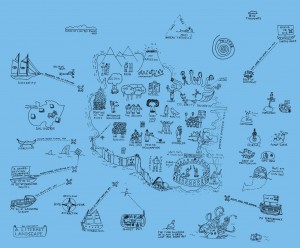
And Dunthorne’s (subtle) take on how that mood is cultivated, controlled and channelled, whilst all the while giving us the illusion of freewill, is quietly savage: Via the episode, we get a birds-eye view of the national mood, and the currents in which we all swim / thrash around desperately. Our ‘hero’, a man in his early thirties, is a prototypical waster – not wholly without talent but lacking the wherewithal to harness what he has, and forever side-tracked by the concerns that beset modern man: my job is rubbish, I secretly envy (despise) my friends, I love my wife but am insecure and oh, what is life without vicarious pleasure? And last but by no means least, how the eff do I get on the property ladder? The story takes a turn with a London riot, after which the protagonist, through a run of bad moves and even worse luck, ends up as ‘the face of the riots’ – and thereafter, the fragile components of his life are one-by-one dismantled. But Dunthorne isn’t delivering fire & brimstone from a pulpit: The Adulterants is, first and foremost, a comedy – a black comedy a romp with a dark underbelly, bristling with the protagonist’s nervous energy. Moving within a confined locus (zones 2-4 of East London), we observe the pinnacle of human evolution in his natural habitat as he goes to house parties, fingers his friend’s wife, gets beaten up, and then proceeds to combine the get-go of a corpse with the aspirations of Caesar. Through a cast of characters that are brilliantly sketched (and thus painfully recognisable), Dunthorne takes us into the heartland of late modernity’s finest – Clapton. Unfortunately, as Joe Dunthorne shows us in The Adulterants, we flatter ourselves to think this true.

Lengthy though the process is, it’s hoped that the message is both understood and adopted by the age of thirty. That ‘attack first, ask questions later’ is not always the best option.


That one does not have to build a moat around one’s possessions. It’s a difficult concept to bed-down, with most resisting the notion that life is more than a series of smash, grab & run raids. Between the ages of 2-3, children learn about sharing.


 0 kommentar(er)
0 kommentar(er)
